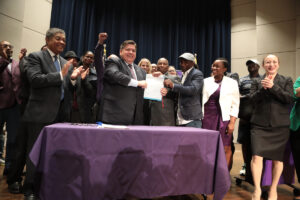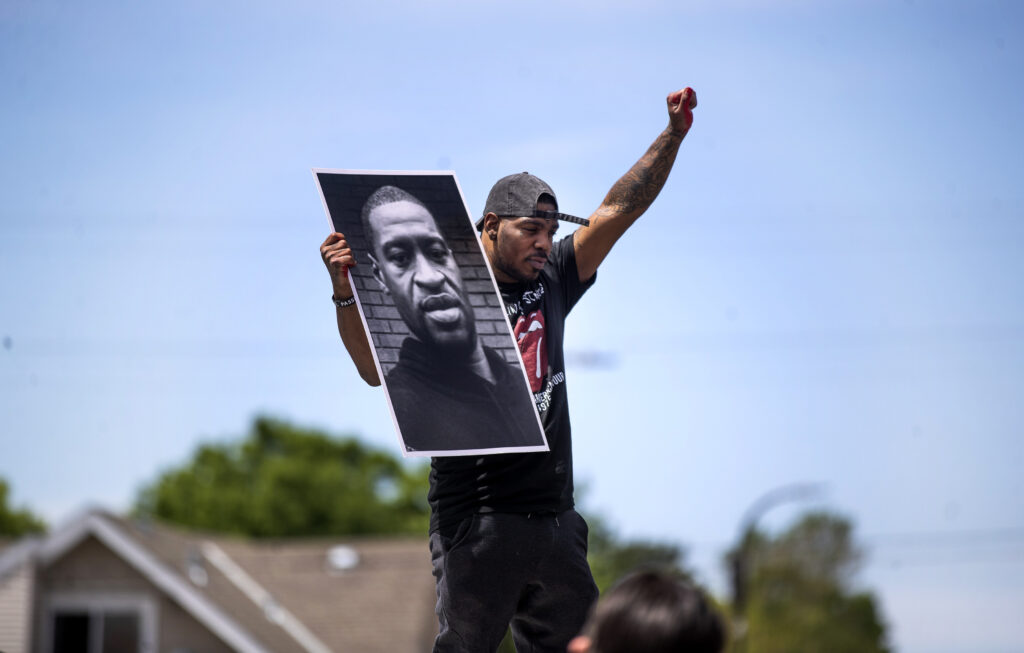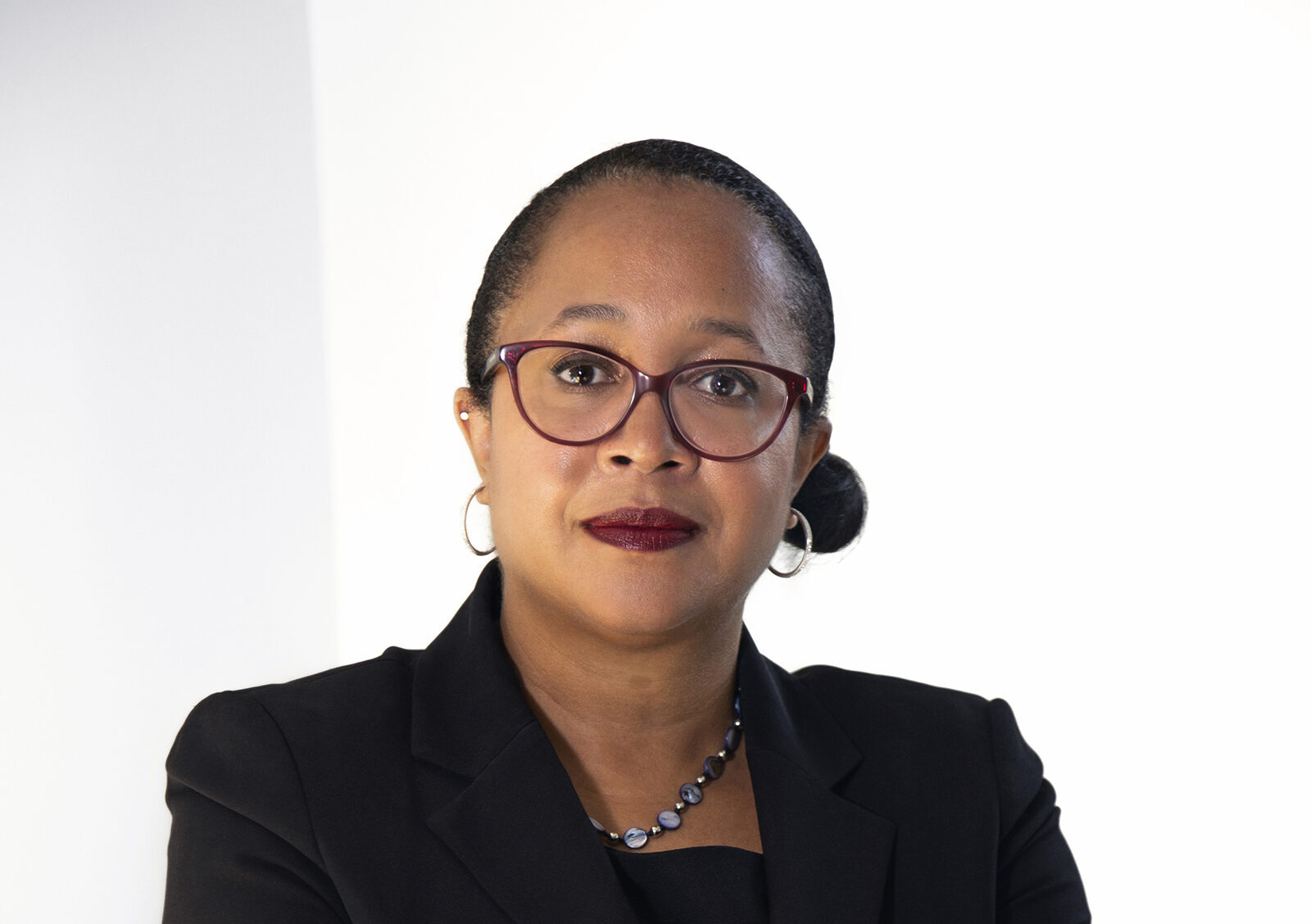Reflecting on the Year Past, I Am Proud, Grateful, and Even More Fired Up to Advance the Innocence Project’s Work
The Executive Director ruminates on the organization's work in her first year on the job.
09.08.21 By Christina Swarns
One year ago today, I stepped into my role as Executive Director of the Innocence Project. It has been an extraordinary year, and I am immensely proud of the work we have accomplished with your tremendous support.
We continue to advocate for wrongly convicted people like Pervis Payne and Rodney Reed. We have freed and exonerated clients like Termaine Hicks, Eddie Lee Howard, and Jaythan Kendrick. In championing transformative legislation, scientific standards, and smarter practices that are making criminal legal systems more just and equitable, we’ve also secured major policy wins across the country.

Gov. Pritzker signs deception bill with exonerees, Innocence Project staff and State Attorney Kim Foxx on Thursday, July 15, 2021 in Chicago. (Jean-Marc Giboux/AP Images for Innocence Project)
In Illinois, we helped prevent police from lying to children during questioning, spurring other states to follow suit. We saw Virginia become the first Southern state to abolish the death penalty, after the governor cited Innocence Project client Earl Washington, and acknowledged the real and unacceptable risk of convicting, condemning, and executing an innocent person. We also saw Maryland pass laws that will strengthen police transparency and accountability and offer clear guidelines for compensating the wrongfully convicted.
We are enormously grateful for people like you. You have stepped up in droves to advocate for policy change, to call legislators and district attorneys around the country, and to generously support fundraising efforts to bring relief to our clients. We couldn’t do it without you.
But I have to be honest: The past year has not been easy.
A Year of Challenges and Renewed Determination
When I joined the Innocence Project last September, the nation was in the midst of extraordinary upheaval.
We were experiencing a second surge of COVID-19 cases and deaths, adjusting to the jarring new normal of limited human interaction, barreling towards a pivotal, emotionally charged presidential election, and grappling with a racial reckoning sparked by the senseless murders of George Floyd, Breonna Taylor, and too many more Black people at the hands of law enforcement.

Tony L. Clark holds a photo of George Floyd outside the Cup Food convenience store, near where Floyd was killed, May 28, 2020, in Minneapolis. (Image: Jerry Holt/Star Tribune via AP)
Like so many organizations and individuals across the nation, we were profoundly inspired by the once-in-a-generation demand for justice. We therefore redoubled our commitment to advancing equity and racial justice and understood that meant not only speaking out about racial injustice but also making an institutional commitment to advancing structural reform both internally and externally.
The Innocence Project has long documented and exposed the ways in which racial bias plagues criminal legal systems and contributes to wrongful convictions. Of the more than 200 exonerations we have helped secure, 63% of these cases involved innocent Black people. Since 1989, nearly 50% of people in the U.S. who were wrongfully convicted and later found innocent are Black. And a review of more than 130 cases involving death sentences that were overturned because of intellectual disability found that 80% of cases involved people of color.
These numbers starkly demonstrate that we cannot fulfill our mission to free the innocent and prevent wrongful conviction without a strong, explicit commitment to racial justice.
Moving Further on Racial Justice
Thurgood Marshall once said, “Where you see wrong or inequality or injustice, speak out, because this is your country. This is your democracy. Make it. Protect it. Pass it on.” We will do just that. We’ll continue to talk about race and how bias permeates criminal legal systems.

Innocence Project Senior Staff Attorney Susan Friedman with client Jaythan Kendrick after his exoneration on Nov. 19, 2020, in New York. (Image: Ben Hider/AP Images for Innocence Project)
We will move reforms that ameliorate the racial bias that exacerbates wrongful convictions, including legislation that strengthens police accountability, prevents false confessions, and ensures accurate identifications. We know from our own cases that 69% of those who falsely confessed and were wrongfully convicted were Black or brown. We also know that 45% of our 149 eyewitness misidentification cases involved cross-racial misidentification.
In pushing to transform criminal legal systems for all Americans, we are exploring innovative initiatives and partnerships — across departments and organizations — to shine a light on racial injustice and bring real and lasting change to those most affected.
Building Our Community
As we take this fight to our nation’s courts and Capitol, we are also looking inward, to ensure we are living the same values we pursue with urgency in our work.
Like so many social justice organizations, we are actively working to ensure that the policies and practices of the Innocence Project advance equity. We know that strengthening our internal culture, empowering our extraordinary staff, and honoring their diversity and expertise is necessary to advance the work, deepen our impact, and, ultimately, accomplish our mission. We will bring the same passion, commitment, and rigor to this internal justice work as we bring to our clients’ cases and policy campaigns.
In closing, I cannot say enough about our extraordinary clients, who inspire me everyday to lean into this work with courage and ambition. Nor about the extraordinary team at the Innocence Project. I wish I had the opportunity to meet more of our staff in person, but, even on Zoom, the energy, grit, and savvy of the people I work alongside is infectious.
And then, there are the people like you. Our amazing supporters, donors, and activists who make the work possible and share the kudos for our every achievement.
With your support, we have grown our team, expanded our caseload, strengthened the support we can offer exonerees, leaned into science, and developed an ambitious policy agenda. In the past year alone, we have freed and exonerated seven people and secured 21 legislative wins.
As we approach our 30th anniversary next year, we are in an incredibly strong position to drive the change we want to see. Guided by science and grounded in anti-racism, we will continue our work to create fair, compassionate, and equitable systems of justice for everyone; to free the innocent; and prevent wrongful convictions.
I am thankful for your continued support and incredibly excited for the opportunities that lie ahead.
Christina Swarns
Executive Director, Innocence Project
Leave a Reply
Thank you for visiting us. You can learn more about how we consider cases here. Please avoid sharing any personal information in the comments below and join us in making this a hate-speech free and safe space for everyone.
September 10, 2021 at 8:30 am
September 10, 2021 at 6:56 am
God Bless Innocence Project and all the People involved! Stay True Believers and continue this important fight. You are warriors of positive change! I am a retired attorney and I did a two-year stint as a public defender. I am researching how I can volunteer to help. Grateful Citizen of Humanity.

I am with you.